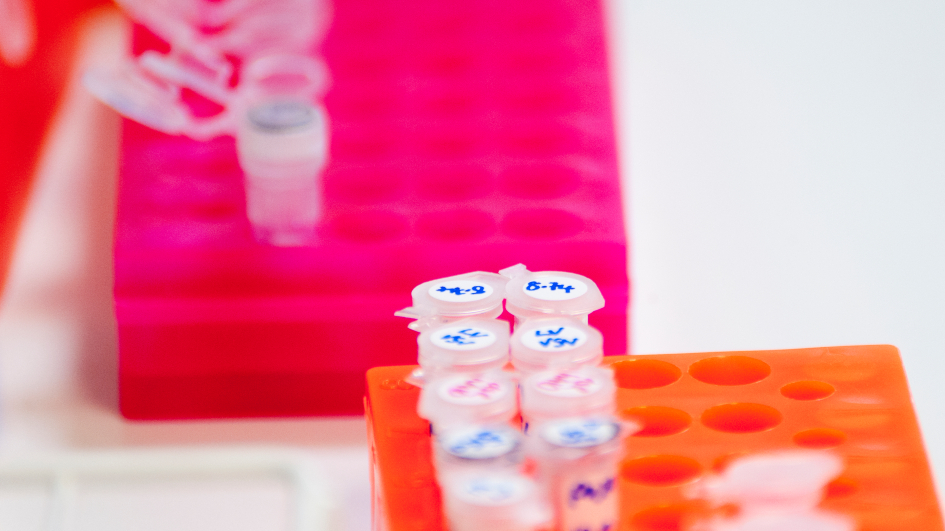
Our staff and students here at The Institute of Cancer Research are supporting the national effort against the new coronavirus in a variety of ways – from working at the NHS front line to lending expertise in genomics.
One of the most intriguing of our new projects to combat the COVID-19 pandemic is a laboratory programme to develop antibodies against the virus that causes it, SARS-Cov2.
SARS-Cov2 antibodies
Professor Terry Rabbitts – who is Professor of Molecular Immunology at the ICR and usually focused on identifying possible new cancer drugs – has started a project that could lead to a new method of testing people for the coronavirus using an antibody ‘tetramerisation’ technology, already developed by his team.
The research may also lead to a new way of treating patients with symptoms, by giving them artificial antibodies that could boost their own immune response to the virus.
Antibodies
Antibodies are large, Y-shaped proteins that bind very specifically to other molecular structures, called antigens.
Originally ‘antibody’ was a definition from the field of immunology – the study of the immune system – and used to describe the antibodies that recognise antigens on the surface of threats like viruses.
But now ‘antibody’ is used by scientists to refer to a wide range of proteins that can either be natural products of the immune system, or built artificially in the lab.
Their uses in medicine are widespread, including in detecting the presence of specific types of disease, and as therapeutics: which attack diseases like cancer directly, or flag up a threat to the body like cancer for destruction by the host’s immune system.
We have a proven track-record of awe-inspiring research, which is transforming the lives of cancer patients around the world. This work is made possible by an extraordinary community of generous donors, which includes individuals, trusts and foundations and charity partners.
Coronavirus testing
Professor Rabbitts has led the development of a new antibody technology. It works by converting antibodies into four-part proteins – or tetramers – which can be used in a scientific testing method called ELISA.
This test could be used clinically to tell whether a person is infected by the SARS-Cov2 coronavirus.
As Professor Rabbitts explains:
“Our initial work will be to develop an ELISA test that could detect the SARS-Cov2 virus in patients coming into hospitals with symptoms of COVID-19, so that they can quickly be moved to the correct wards and treatments. It could also be used in the testing of health workers or in those staying in hospitals or care homes. Eventually, the test could be adapted for home use.”
Current testing for the SARS-Cov2 virus uses a different technique called reverse transcriptase polymerase chain reaction, or RT-PCR. This test amplifies the DNA of the coronavirus to detectable levels.
ELISA, however, has some potential advantages over RT-PCR as a test for the virus.
“Our aim is to be able to replace this test with our antibody assay which should be, using our multivalent antibodies, more sensitive, quicker, easily transferable to clinical labs and relatively high throughput,” Professor Rabbitts says.
Although based on ‘antibodies’, the test will use synthetic antibodies to detect the presence of virus particles: not antibodies made by people against the virus.
Biotechnology
Professor Rabbitts joined the ICR this year from the University of Oxford, where he made an enormous scientific impact in a range of fields.
Most famously, he led the development of cDNA cloning, which is now used widely in bioscience and biotechnology. He worked out the organisation of human antibody genes and, with the late Michael Neuberger, he also pioneered the construction of so-called chimaeric antibodies – used as treatments in a wide variety of diseases.
As well as leading to a new test for virus, his new project could generate a new treatment for COVID-19, too, through the development of some of these therapeutic antibodies. His team’s high-affinity antibodies – which it is hoped will strongly bind to the coronavirus – could be used to direct patients’ immune systems towards the viral threat.
As Professor Rabbitts says:
“Our work could also lead to a new way of treating patients with symptoms, by augmenting their immune responses with potent antibodies to add to those they are already producing.”
This form of treatment is already used to treat a range of other diseases.
Professor Rabbitts’s work to develop anti-SARS-Cov2 antibodies is just one example of how scientists at the ICR – and across London and the UK more widely – are using their expertise for new purposes, reacting with determination and energy to one of the biggest challenges now faced by humankind.